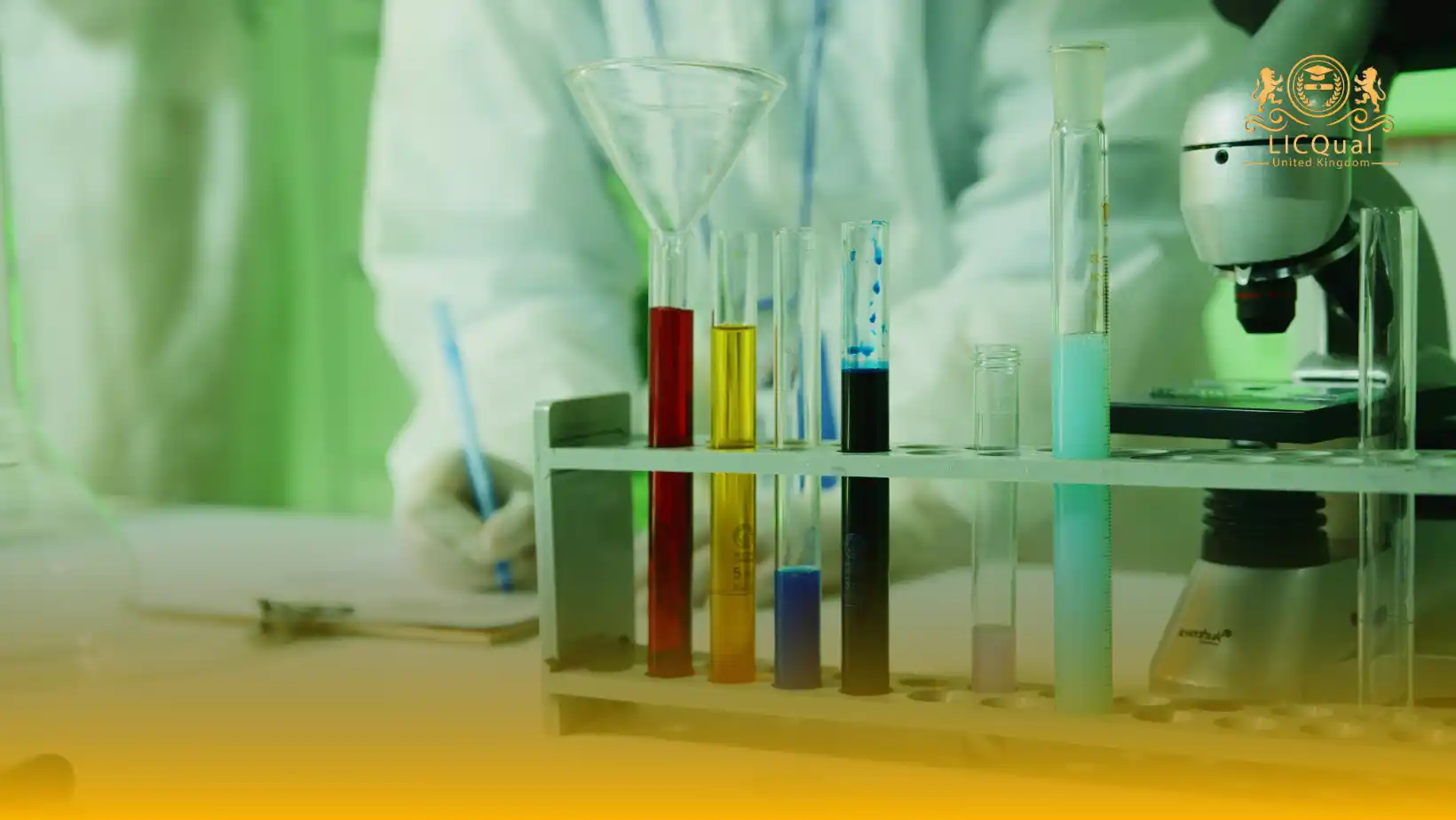The LICQual Level 6 Diploma in Nutritional Biochemistry (Dip Nutritional Biochemistry) is an advanced qualification designed for professionals seeking to enhance their expertise in the scientific foundations of nutrition and human health. This Level 6 diploma provides learners with in-depth knowledge of biochemical processes, nutrient metabolism, and the molecular mechanisms that underpin dietary interventions and wellness strategies.
Ideal for nutritionists, dietitians, healthcare practitioners, and wellness professionals, this qualification supports career progression, broadens professional knowledge, and contributes to recognised Continuing Professional Development (CPD).
Learners will explore complex topics such as nutrient bioavailability, enzymatic pathways, metabolic regulation, and the interplay between diet and cellular function. The programme emphasises the application of biochemical principles to real-world nutritional challenges, equipping learners to analyse scientific data, develop evidence-based dietary strategies, and provide informed guidance to diverse populations.
Centres delivering the LICQual Level 6 Diploma in Nutritional Biochemistry must uphold the highest standards of training. This includes employing competent and qualified staff, providing comprehensive learning materials, and ensuring access to necessary resources and facilities. Such measures create a supportive and effective learning environment, enabling learners to fully engage with the course content and achieve success.
Upon completion, learners will be equipped with advanced scientific knowledge, practical skills, and professional competence, ready to apply biochemical insights to nutritional practice, improve client outcomes, and make a meaningful impact in the fields of health, nutrition, and wellness.
Course Overview
Qualification Title
LICQual Level 6 Diploma in Nutritional Biochemistry (Dip Nutritional Biochemistry)
Total Units
6
Total Credits
120
GLH
480
Qualification #
LICQ2201077
Qualification Specification
To enroll in the LICQual Level 6 Diploma in Nutritional Biochemistry (Dip Nutritional Biochemistry) , applicants must meet the following criteria:
|
Qualification# |
Unit Title |
Credits |
GLH |
|---|---|---|---|
|
LICQ2201077-1 |
Advanced Human Biochemistry |
20 |
80 |
|
LICQ2201077-2 |
Nutrient Metabolism and Function |
20 |
80 |
|
LICQ2201077-3 |
Molecular Nutrition and Bioactive Compounds |
20 |
80 |
|
LICQ2201077-4 |
Nutritional Biochemistry in Health and Disease |
20 |
80 |
|
LICQ2201077-5 |
Research Methods and Evidence-Based Practice |
20 |
80 |
|
LICQ2201077-6 |
Professional Practice and Ethics in Nutritional Biochemistry |
20 |
80 |
By the end of this course, learners will be able to:
Unit 1: Advanced Human Biochemistry
Learners will be able to:
- Explain complex biochemical processes and metabolic pathways relevant to human health
- Analyse the role of enzymes, co-factors, and molecular mechanisms in nutrient metabolism
- Apply biochemical knowledge to understand physiological functions and nutritional requirements
- Critically evaluate biochemical concepts to inform professional practice in nutrition
Unit 2: Nutrient Metabolism and Function
Learners will be able to:
- Describe the digestion, absorption, transport, and utilisation of macro- and micronutrients
- Evaluate the impact of nutrient deficiencies and excesses on health and disease
- Apply metabolic principles to assess dietary strategies and optimise nutritional intake
- Critically interpret nutrient interactions within complex biological systems
Unit 3: Molecular Nutrition and Bioactive Compounds
Learners will be able to:
- Analyse the role of vitamins, minerals, and bioactive compounds in cellular and molecular function
- Evaluate the effects of nutrients on gene expression, signalling pathways, and metabolic regulation
- Apply molecular nutrition principles to design evidence-based dietary strategies
- Critically assess scientific literature on bioactive compounds and their impact on health
Unit 4: Nutritional Biochemistry in Health and Disease
Learners will be able to:
- Assess the biochemical basis of metabolic disorders and chronic diseases
- Develop nutrition-based interventions for disease prevention and management
- Critically evaluate the effectiveness of dietary strategies in improving health outcomes
- Apply biochemical knowledge to personalised nutritional counselling and planning
Unit 5: Research Methods and Evidence-Based Practice
Learners will be able to:
- Critically appraise scientific research and interpret data in nutritional biochemistry
- Apply evidence-based principles to professional nutritional practice
- Use research findings to inform decision-making and intervention strategies
- Demonstrate the ability to integrate new knowledge into practical nutritional applications
Unit 6: Professional Practice and Ethics in Nutritional Biochemistry
Learners will be able to:
- Demonstrate professional and ethical conduct in all aspects of nutritional biochemistry practice
- Understand and apply relevant legal, regulatory, and professional standards
- Develop and implement a structured Continuing Professional Development (CPD) plan
- Reflect on personal practice to maintain competence and enhance professional growth
The LICQual Level 6 Diploma in Nutritional Biochemistry (Dip Nutritional Biochemistry) is designed for learners who want to specialize in the science of nutrition at a molecular level. This course is ideal for learners aiming to enhance their professional knowledge, apply biochemical principles in dietary planning, and advance their careers in healthcare, research, and wellness.
Healthcare Professionals
- Learners who are doctors, nurses, and allied health professionals seeking advanced biochemical nutrition knowledge
- Learners supporting patients with metabolism-related conditions
- Learners integrating molecular nutrition into clinical practice
- Learners working in hospitals, clinics, or wellness centers
- Learners seeking accredited Level 6 certification
- Learners aiming to enhance professional credibility in healthcare nutrition
Dietitians and Nutritionists
- Learners who are registered dietitians looking to specialize in biochemical nutrition
- Learners creating personalized diet plans based on metabolism and nutrient needs
- Learners managing chronic diseases with nutrition interventions
- Learners enhancing counseling and clinical assessment skills
- Learners expanding career opportunities in research, private practice, or hospitals
- Learners seeking flexible online learning options
Wellness and Fitness Professionals
- Learners providing nutrition guidance in wellness or fitness programs
- Learners designing diet plans with a biochemical approach
- Learners integrating molecular nutrition into holistic health coaching
- Learners improving client health outcomes through evidence-based strategies
- Learners aiming for professional Level 6 certification
- Learners interested in applying scientific nutrition principles in practice
Aspiring Nutrition Specialists
- Learners preparing for careers in clinical nutrition or research
- Learners who are recent graduates in health, nutrition, or life sciences
- Learners seeking structured, advanced education in molecular nutrition
- Learners exploring online, flexible study options
- Learners developing practical, real-world skills in biochemistry-based nutrition
- Learners aiming for recognized professional qualifications
Public Health and Research Practitioners
- Learners involved in community nutrition programs
- Learners conducting research in metabolism and nutrition
- Learners promoting science-based dietary interventions
- Learners working with NGOs or public health organizations
- Learners aiming to improve population health outcomes
- Learners seeking accredited certification to boost research credibility
Corporate and Workplace Wellness Professionals
- Learners managing employee nutrition and wellness programs
- Learners designing diet workshops based on scientific nutrition principles
- Learners advising clients on metabolism and lifestyle optimization
- Learners implementing evidence-based wellness strategies
- Learners enhancing professional credibility with Level 6 certification
- Learners integrating biochemistry into workplace nutrition initiatives
General Health and Nutrition Enthusiasts
- Learners passionate about science-based nutrition
- Learners supporting personal or family health through diet
- Learners seeking structured, accredited learning in molecular nutrition
- Learners aiming to make informed dietary and lifestyle decisions
- Learners interested in becoming certified experts in nutritional biochemistry
- Learners wanting practical knowledge to apply in everyday life
Centres delivering the LICQual Level 6 Diploma in Nutritional Biochemistry must adhere to high standards to ensure quality training and learner success. Key requirements include:
- Qualified and Competent Staff: Centres must employ experienced trainers with recognised qualifications in nutrition, biochemistry, health sciences, or related disciplines to provide expert guidance and mentorship.
- Adequate Learning Resources: Centres should provide comprehensive course materials, reference texts, and digital resources to support learners in both theoretical and practical aspects of nutritional biochemistry.
- Suitable Training Facilities: Learning environments, whether in-person or online, must be safe, well-equipped, and conducive to effective teaching and engagement.
- Assessment and Feedback Systems: Centres must implement robust procedures for evaluating learner progress, providing constructive feedback, and supporting achievement of learning outcomes.
- Commitment to CPD: Centres should encourage Continuing Professional Development, ensuring learners and staff remain updated on the latest research and best practices in nutritional biochemistry.
- Health and Safety Compliance: Centres must comply with relevant health and safety regulations to maintain a secure environment for all learners.
- Technology and Online Access: For online or blended delivery, centres must provide reliable digital platforms, internet access, and technical support to facilitate interactive learning and assessments.
By meeting these requirements, centres ensure learners receive high-quality, internationally aligned training, enabling them to develop advanced skills in nutritional biochemistry and successfully apply their knowledge in professional practice.
Assessment and Verification
All units within this qualification are subject to internal assessment by the approved centre and external verification by LICQual. The qualification follows a criterion-referenced assessment approach, ensuring that learners meet all specified learning outcomes.
To achieve a ‘Pass’ in any unit, learners must provide valid, sufficient, and authentic evidence demonstrating their attainment of all learning outcomes and compliance with the prescribed assessment criteria. The Assessor is responsible for evaluating the evidence and determining whether the learner has successfully met the required standards.
Assessors must maintain a clear and comprehensive audit trail, documenting the basis for their assessment decisions to ensure transparency, consistency, and compliance with quality assurance requirements.







